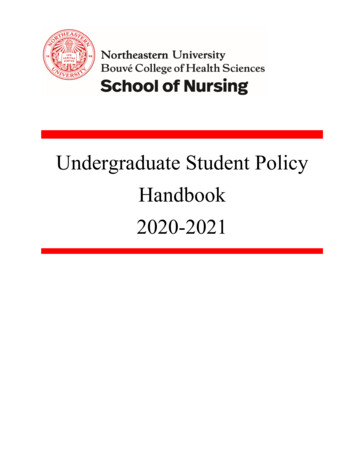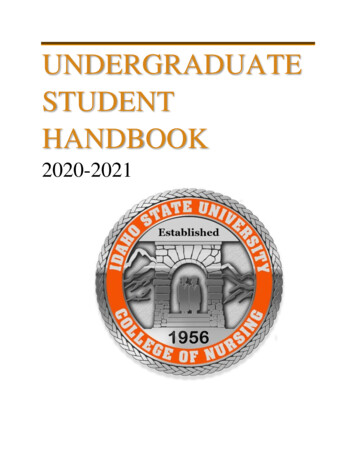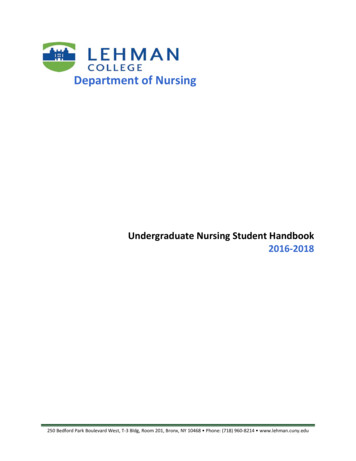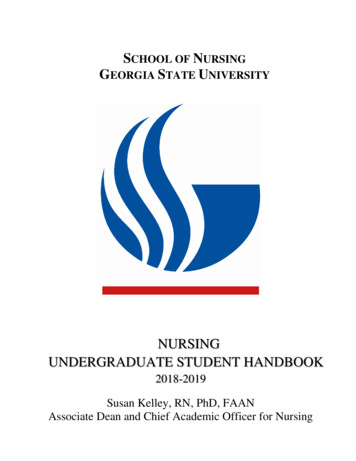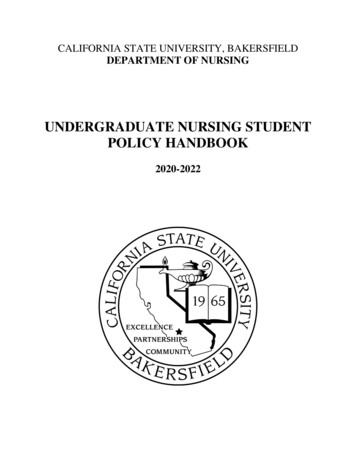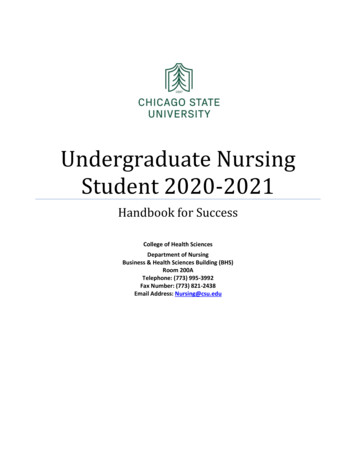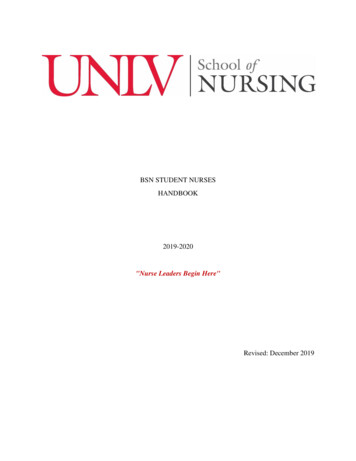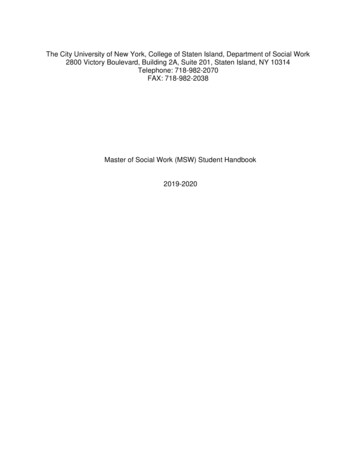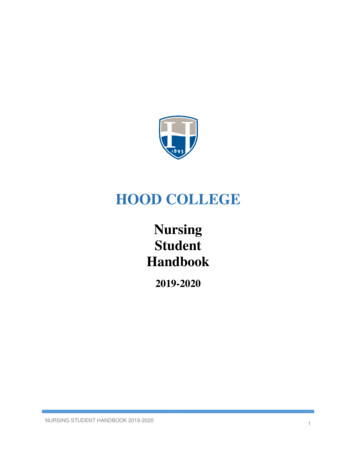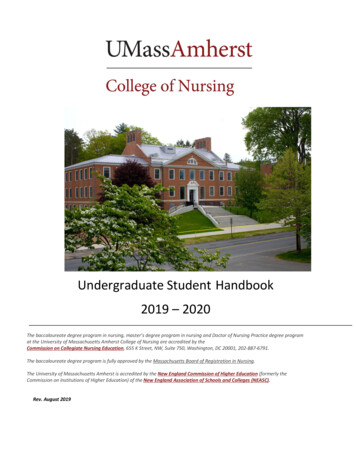
Transcription
Undergraduate Student Handbook2019 – 2020The baccalaureate degree program in nursing, master’s degree program in nursing and Doctor of Nursing Practice degree programat the University of Massachusetts Amherst College of Nursing are accredited by theCommission on Collegiate Nursing Education, 655 K Street, NW, Suite 750, Washington, DC 20001, 202-887-6791.The baccalaureate degree program is fully approved by the Massachusetts Board of Registration in Nursing.The University of Massachusetts Amherst is accredited by the New England Commission of Higher Education (formerly theCommission on Institutions of Higher Education) of the New England Association of Schools and Colleges (NEASC).Rev. August 2019
Faculty Welcome to StudentsWelcome to the College of Nursing at the University of Massachusetts Amherst. This is an excitingplace to live, study, work, and grow. We are part of a large university thriving on a tradition ofexcellence, and offer an exciting curriculum supported by an array of educational resources. Thishandbook is a resource for you. The curricula for our programs, as well as specific admission,retention, progression, and graduation policies for each track, are contained within this handbook.Please read this handbook carefully, as it contains the most updated policies that pertain to youreducational experience.Our talented and committed faculty are innovators, striving to offer the best possible studentcentered instruction. Our goal is to encourage lifelong learning in students who will soon be entrylevel clinicians, returning professionals who seek to enhance their knowledge, skills and analyticalabilities, and researchers developing new knowledge for the discipline. The educational experienceyou receive is supported by the outstanding commitment of our staff.We are a force for innovation, learning and discovery in preparing culturally proficient nurses to meetthe complex healthcare needs of a global community. We encourage and invite you to be an activeparticipant within the college, as a member of the Student Nurses Association, a committee member,or a volunteer in many of the university and college’s activities.As educational opportunities and policies are subject to periodic changes, the College of Nursing andthe University of Massachusetts must reserve the right to make changes affecting any mattersdiscussed in this publication. For current policies, please refer to the online version of the handbookon the College of Nursing website: www.umass.edu/nursing.Thank you for choosing the University of Massachusetts Amherst College of Nursing to advance yournursing career. We look forward to an exciting year!
ForewordThe College of Nursing Student Undergraduate Student Handbook is designed to supplement theUniversity and College of Nursing websites as well as the University Code of Student Conducthttps://www.umass.edu/dean students/codeofconduct and Academic s/policies-and-practices/academic-regulations. Students areresponsible for acting in accordance with the University and College of Nursing regulations and policiesset forth in these publications. The College of Nursing Undergraduate Student Handbook also providesadditional information specific to the nursing program, which will be helpful to you throughout yourstudies here.The Student Handbook is reviewed annually during summer term and is as accurate and current aspossible. Any changes in policies, procedures, or regulations will be communicated via email tostudents, who will assume responsibility for complying with them. Please take the time to familiarizeyourself with the Handbook. It provides an extremely useful continuing orientation to the programs,faculty, and standards of the College of Nursing. If you have a problem or concern that is notadequately answered by the Handbook, please consult your academic advisor, faculty advisor, orprogram assistant.
Table of ContentsI.College of Nursing History and OrganizationHistoryAccreditationValues, Vision, Mission and GoalsKey PoliciesAdmissionProgressionAttendanceCourse ExemptionAdvanced PlacementTransferEducational MobilityWithdrawalReadmissionGraduationStudents’ Rights and GrievancesCollege of Nursing Deans, Program Directors, and te Bachelor of Science ProgramGeneral InformationObjectives of the Bachelor of Science Program2324Four Year Nursing MajorGeneral Information and Admission RequirementsProgram of StudyEstimated Cost242529RN to BSGeneral Information and Admission Requirements30
Program of StudyTechnical RequirementsEstimated CostIII.313334Accelerated BachelorsGeneral Information and Admission RequirementsProgram of StudyEstimated Cost343536Description of Courses in the Undergraduate Program37Special Academic ProgramsDepartmental Honors in Nursing – Commonwealth CollegeNursing Residential Academic Program (Nurse RAP)International Programs414242College of Nursing Requirements, Policies and ProceduresSee also “Key Policies” on p. 10Academic PoliciesGeneral Academic PoliciesGradingGuidelines for Independent Study ContractNCLEX PreparationProfessional ConductUndergraduate Baystate ID Badge PolicyAcademic Policy and Procedure for Professional Conduct StandardsViolation Report for Standard of Safe Nursing Practice of ProfessionalConduct PolicyProfessional Conduct Policy for the College of Nursing – SignatureSheetRegistrationElectronic Testing PolicyClinical Setting Policies and ProceduresHealth RequirementsCORI and FingerprintingUndergraduate Credentialing PolicyGood Moral Character PolicyGuidelines for Conduct in Clinical SettingsMedical Administration PolicyProfessional Conduct and the Code of Ethics for 555565657
Unsafe Nursing Practice PolicyUniform PolicyHealth/Illness/Injury PolicyCode of Student ConductAcademic Honesty PolicySocial Media and Email PolicyTechnology PolicyUniversity Policy on Student Absence for Religious ObservanceAlcoholic Beverage Policy, Smoke-Free Policy and the Drug-FreeSchools ActResponding to a Critical IncidentIV.V.575959616364656566General InformationAcademic AdvisingProcess for Academic AdvisingCourse EvaluationsProgram Evaluation676768Support Services on CampusUMass Amherst LibraryResource and Simulations LaboratoriesInformation TechnologyCampus Organizations and ResourcesFinancial Aid for Undergraduates6868696970Student Scholarships, Awards and RecognitionGeneral InformationAwards7071Organizations and Associations72Student Participation in College of Nursing Governance74AppendixAppendix A: College of Nursing AdministrationDeans, Directors and Administrative OfficesAdvisory BoardFaculty and Staff Rosters757781
Appendix B: Clinical Evaluation ToolAppendix C: Pre-Clinical Drug Screening ConsentAppendix D: Screening for Reasonable Suspicion of Drug/Alcohol MisuseAppendix E: Random Drug ScreeningAppendix F: Incident ReportAppendix G: ATI Testing Policy848990919293
I.College of Nursing History, Accreditation and OrganizationHistoryAt its founding in 1953, the College of Nursing offered the first baccalaureate nursing program inpublic higher education in the Commonwealth of Massachusetts. Four years later, the Collegelaunched the first Master of Science degree program, and in 1994, the Commonwealth's first publiclysupported Ph.D. program in Nursing in collaboration with the University of Massachusetts MedicalSchool Graduate School of Nursing. In 2005, the college offered its first Ph.D. program sponsoreduniquely by the College of Nursing and in 2006 the first Doctorate of Nursing Practice (DNP) programin the state.Continuous accreditation first by the National League for Nursing, and currently by the Commissionon Collegiate Nursing Education (CCNE), along with the success of graduates in passing both licensingand certification exams, testify to the enduring quality of the college's programs, faculty, andcurriculum.The College of Nursing is one of eleven schools and colleges comprising the University ofMassachusetts Amherst, founded in 1863. The University is a Carnegie Designated ResearchUniversity Very High (RUVH) and the flagship campus of the five-campus public university system.Sponsored research now totals over 210 million a year, with increasing emphasis on the life sciencesand biotechnology applications.Embodying the university's commitment to high quality, accessible education, the College of Nursingis committed to meeting the challenges faced by the nursing profession in the context of the changingdynamics of society and the delivery of health care.AccreditationThe baccalaureate degree program in nursing, master’s degree program in nursing and Doctor of Nursing Practice degreeprogram at the University of Massachusetts Amherst College of Nursing are accredited by theCommission on Collegiate Nursing Education, 655 K Street, NW, Suite 750, Washington, DC 20001, 202-887-6791.The baccalaureate degree program is fully approved by the Massachusetts Board of Registration in Nursing.The University of Massachusetts Amherst is accredited by the New England Commission of Higher Education (formerly theCommission on Institutions of Higher Education) of the New England Association of Schools and Colleges (NEASC).
Values, Vision, Mission and GoalsApproved by the Faculty Assembly May 21, 2008; reviewed June 2018VisionThe College of Nursing is a force for innovation, learning and discovery in preparing culturallyproficient nurses for leadership in health for a global society.MissionTo provide an affordable and accessible education to enhance health and healing through nursingleadership in teaching, scholarship, practice and service.ValuesWe, the faculty of the College of Nursing, are committed to:Caring and Collaborative Relationships Caring and compassion as the heart of evidence-based nursing practice. Collaboration with clients, nursing and interdisciplinary peers as essential to enhancinghealth and healing. Attending to the needs of vulnerable and underserved populations.Leadership Nursing's contribution to reducing health disparities and promoting health in a globalsociety. An environment that enhances the social conscience and professionaldevelopment of all members of the College of Nursing. The knowledge that environments are interrelated systems that affect and are affectedby nursing practice, culture, and public policy. Students developing their identity as agents for innovation in the world.Excellence The reciprocal relationships among teaching, scholarship, and engagement. Encouraging integrity and high moral character in all members of the College of Nursing. Becoming reflective practitioners to increase the authenticity of our work (Boyer).Innovation Creative ways of acquiring, managing and sharing knowledge.Diversity Striving to design and provide culturally sensitive nursing care in a global society. Promoting diversity in our College and in the profession.Lifelong Learning Arts, humanities, and sciences as a foundation for nursing education. Learning as a dynamic, collaborative process that promotes mutual growth of studentsand teachers.
GoalsWe, the faculty of the College of Nursing, are committed to the following goals:Engagement GoalsTo establish innovative scholarly engagement models that define and respond to the health ofthe public. Our goals are to: Contribute to the search for answers to the most pressing social, civic, economic and moralproblems facing our profession and world today (Boyer).Facilitate and enhance an organizational culture of diversity that promotes the success ofcollaborative partnerships, relationships, and affiliations within a global community.Promote and expand faculty practice, which reflects the expertise of faculty and needs ofour communities of interest.Promote faculty development and systematic understanding through a variety ofmechanisms that would include:ooo Coordinating access to all existing internal university resources.Securing external global resources.Mentoring faculty with the ongoing development of their academic careers.Contribute to systematic and structural improvement of the University and University ofMassachusetts systems.Promote service to the underserved and vulnerable populations in our region.Teaching GoalsWe prepare professional nurses by creating an innovative environment for inquiry, discovery,and learning with diverse populations. Our goals are to: Ensure a flexible learner-centered environment that utilizes information technology to itshighest potential to ensure collaboration and inclusiveness.Foster the advancement of students through graduate education.Ensure a comprehensive, cohesive curriculum that prepares students for leadership in achanging and diverse sociopolitical world.Scholarship GoalsEnhance the art and science of nursing by creating, translating, and disseminating knowledge.Our goals are to: Facilitate the scholarship of discovery, integration, application and teaching.Foster a creative environment that supports scholarship activities.Enhance mechanisms for interdisciplinary scholarship.
Key PoliciesAdmissionsUndergraduate Nursing MajorAdmission to the freshman Nursing class at the University of Massachusetts Amherst iscontingent upon successful completion of required high school courses at a level consistentwith the University’s and the College of Nursing’s admissions standards. The College of Nursingadministration (dean or designee) meets annually with the Office of University Admissions toreview the criteria for admission. The primary criteria for admission are the high schooltranscript and SAT/ACT scores. The University of Massachusetts Amherst uses a holisticadmissions review. Factors like personal experiences, strengths, and compatibility with theuniversity are also considered.Candidates must provide satisfactory evidence of secondary school graduation (official High School orGED/HiSET transcript), or its equivalent (e.g. Associate, Bachelor, Master, or Doctoral degree).Candidates must include translations and evaluations of non-English transcripts. Candidates must alsocomply with the immunization requirements specified by the Massachusetts Department of PublicHealth. Applicants are notified about admissions decisions by the University's UndergraduateAdmissions Office. More information about the admissions process is available on the Admissionswebsite.Accelerated BSAdmission to the Accelerated BS in Nursing is contingent upon successful completion of a firstundergraduate degree (BA or BS) and the required prerequisites. Candidates must provide satisfactoryevidence of secondary school graduation (official High School or GED/HiSET transcript), or its equivalent(e.g. Associate, Bachelor, Master, or Doctoral degree).Candidates must include translations and evaluations of non-English transcripts. Candidates must alsocomply with the immunization requirements specified by the Massachusetts Department of PublicHealth. Accelerated BS in Nursing applications are submitted to the Division of Online/ContinuingEducation (OE) and reviewed and approved by the College of Nursing. Applicants are notified aboutadmissions decisions by the College of Nursing.RN to BSAdmission to the RN to BS is open to registered nurses who have completed required prerequisites andwhose cumulative GPA is 2.5 or higher. Candidates must provide satisfactory evidence of secondaryschool graduation (official High School or GED/HiSET transcript), or its equivalent (e.g. Associate,Bachelor, Master, or Doctoral degree). Candidates must include translations and evaluations of non-
English transcripts. Candidates must also comply with the immunization requirements specified by theMassachusetts Department of Public Health. RN to BS applications are submitted to the Division ofOnline/Continuing Education (OE) and reviewed and approved by the College of Nursing. Applicants arenotified about admissions decisions by the College of Nursing.GRADUATE ADMISSIONSAdmission to the graduate programs in nursing requires an application, current licensure as aregistered nurse and an earned Bachelor degree in nursing or a related area, 2 references, aminimum GPA of 3.0 or higher from their bachelor degree and nursing courses and an essay.Applications for Master’s, PhD and Doctor of Nursing Practice programs are submitted to theGraduate School and reviewed by the College of Nursing faculty and program directors. TheGAM committees DNP/PhD in consultation with Director interview students and participate inthe admission process and students are formally notified by the Graduate School.Revised and approved by FA 5/15/19Progression Policy1. Students are advised to follow the recommended sequence of courses. Thestudent carries the responsibility for ensuring that the prerequisites forcoursework are met.2. The academic standard for students in the College of Nursing is a cumulativegrade point average (CGPA) of 2.5 or above, with no grade in a requiredprerequisite course below a C (2.0). Those courses include: KIN 270 and KIN272, any Human Nutrition course, PSYCH 100, and STATISTICS. Refer to theUniversitypolicy: s/academicregs.pdf3. Successful completion of the physical and biological science prerequisites,college writing, and the R1 and R2 Math Tier requirements are required beforebeginning clinical courses .4. The passing grade in all Nursing courses is a C (2.0) or higher.5. If the Cumulative GPA falls below a 2.5 or the student has a grade below C in arequired prerequisite or nursing course, the student is required to meet withtheir nursing faculty advisor and academic advisor.6. Each semester of required courses must be successfully completed beforeprogression to the next semester or to graduation, as outlined in the plan ofstudy, with the exception of nursing research, or other nursing electives.7. Students who do not progress satisfactorily through the nursing curriculum in its regularsequence or who take a leave of absence are not guaranteed that the curriculum andcourses from which they departed will be in place upon their return. They will beexpected to complete the curriculum of their new graduation cohort. Continuation inthe program is based on space availability.
8. Nursing courses may be repeated once with no prior approval and a second time withpermission of the Assistant Dean. Failure to pass an undergraduate nursing course witha grade of C or better by the third attempt will lead to dismissal from the nursingprogram. Repeating a nursing course is on a space-available basis and requirespayment of course tuition and fees.9. Completion of standardized NCLEX style examinations are required for preparation for theNational NCLEX exam.10. Students will be cleared for graduation and application for the RN licensureexamination (NCLEX-RN ) when all graduation requirements of the college anduniversity have been met11. Students must abide by all university policies in addition to those of the Collegeof Nursing.FA 3/8/19; Updated 5/15/19Attendance PolicyFor any absences, students must still meet all course requirements and learning objectives. Theuniversity policy may be found here: andpractices/class-absence-policy. Further College of Nursing information includes:Excused Absences and AttendanceAttendance in class, clinical, simulation, and lab is mandatory for all students. Excused absencesinclude: student illness (with a letter from your healthcare provider),bereavement for an immediate family member,military obligations, orreligious observances.Students who anticipate military and religious absences should notify the faculty at thebeginning of the term so accommodations can be made to complete the learning objectives in atimely way.Students are required to communicate an unexpected absence no later than two hours before
The baccalaureate degree program in nursing, master’s degree program in nursing and Doctor of Nursing Practice degree program at the University of Massachusetts Amherst College of Nursing are accredited by the Commission on Collegiate Nursing Education, 655 K S
